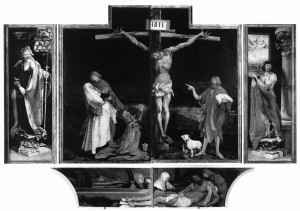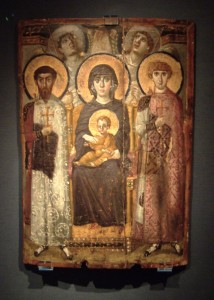One of my favorite crucifixion artworks is the Isenheim Altarpiece that was painted by Matthias Grunewald in 1516 during the Renaissance in (what is today) Germany. An important fact to bear in mind is that this piece was painted expressly for the Monastery of St. Anthony, which was an order that specialized in hospitalization for the plague and also for St. Anthony’s Fire– a particularly painful skin disease that resulted from the digestion of fungi from various cereals such as rye.

Knowing this, it is hard not to see the marks of these diseases in the artwork. The most gruesome aspect of the piece (indeed it is thought to be one of the most horrifying crucifixions ever painted) is the image of the crucified Christ with his body inflicted with plague-like sores and his skin carrying what is unmistakably the marks of St. Anthony’s Fire. Below the center panel there is also a small panel depicting Christ as if his leg has been amputated, another aspect of the disease that many of the sufferers had to face. But why paint Christ as such when, as we know from the Gospels, he was crucified on a cross and not condemned to a death by disease? Well, because the artist is trying to convey to the patients at the monastery that Christ understood their suffering and, as a man, had even experienced suffering on the cross.
This is the image that has haunted me as I look at the photos of the terror attack in Boston this past week. Images of people with scraps of metal and nails flayed into their skin (not unlike Grunewald’s image of the flayed Christ), images of runners and spectators who lost their limbs in the blast, pain and suffering and streams of blood on an American sidewalk in April. Is God here?
After the past year and a half of there have been extremely violent shootings at seemingly innocuous places from a mall to a movie theater, a Sikh temple to an elementary school, and now a marathon. The innocents that have been slaughtered or wounded in these instances are beyond count. The survivors mourn, we vow ‘never again’, we debate about how to prevent these instances of violence, but, all the same, innocents are still killed at the next instance of human-induced deaths. Why does this happen?
There are no easy answers to these questions — which is why, perhaps, the sufferers at Isenheim found their comfort in a crucifixion scene in which their savior identified with their pain. They could not relate to a triumphant and victorious resurrection scene; their doubts and hurts prevented that. It was the suffering of the incarnate innocent that gave them relief.
Some of you may have had the privilege of attending the campus lecture given by Nicholas Woltersdorff, who has written extensively on the suffering of God, during the semester at Houghton last year. He writes these words: “How is faith to endure, O God, when you allow all this scraping and tearing on us? You have allowed rivers of blood to flow, mountains of suffering to pile up, sobs to become humanity’s song–all without lifting a finger that we could see. You have allowed bonds of love beyond number to be painfully snapped. If you have not abandoned us, explain yourself.”
“We strain to hear,” Woltersdorff continues, “But instead of hearing an answer we catch sight of God himself scraped and torn. Through our tears we see the tears of God.”

